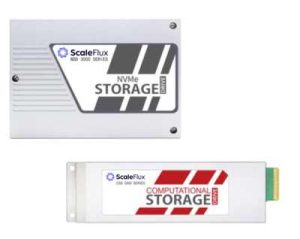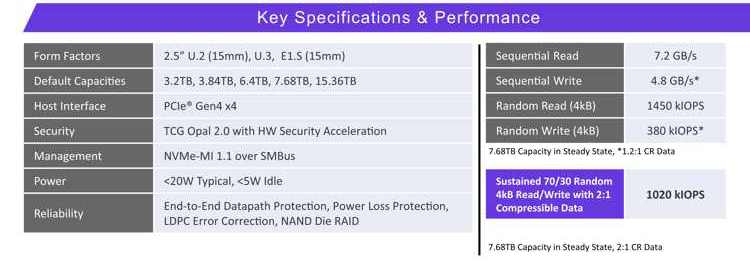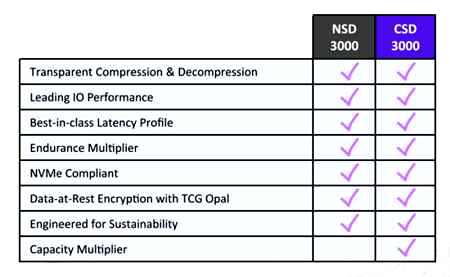ScaleFlux Leads Charge in Sustainable IT Solutions Amidst AI Data Boom
CSD 3000 SSD integrating storage with computational capabilities to lower energy use and operational costs while supporting high-performance data processing
This is a Press Release edited by StorageNewsletter.com on March 14, 2024 at 2:01 pmIn a world increasingly driven by AI and data analytics, the IT sector faces environmental and financial sustainability challenges.
Enterprises and data centers are grappling with the soaring computational needs and power required to handle AI and other data engineering demands. ScaleFlux, Inc. is addressing these challenges head-on with its SSD, the CSD 3000, which integrates storage with computational capabilities to lower energy use and operational costs while supporting high-performance data processing.
 “Drawing from my experience over the years,” said JB Baker, VP, product, “It’s clear that the future of IT hinges on our ability to develop solutions that are not just performant, but also environmentally responsible and economically viable.”
“Drawing from my experience over the years,” said JB Baker, VP, product, “It’s clear that the future of IT hinges on our ability to develop solutions that are not just performant, but also environmentally responsible and economically viable.”
This approach comes at a critical time. Industry analysts, including Gartner, have identified emerging environmental sustainability technologies poised for mainstream adoption by 2025. (1) These technologies, such as cloud sustainability, carbon footprint measurement, and advanced grid management software, aim to mitigate the environmental impact of the IT sector’s expanding carbon footprint, particularly from data centers.
Furthermore, storage trends for 2024 underscore the integration of AI for more efficient and secure storage management. (2) The CSD 3000 is at the forefront of these trends, leveraging computational storage technology to streamline data processing. This reduces the time and energy required for data to be processed and moved and also aligns with global efforts to enhance storage platforms’ security and manageability.
The profound impact of AI on storage and processing, especially in terms of sustainability, highlights the importance of innovations like the CSD 3000. As AI projects demand high-performance, efficient, and reliable data storage, the need for solutions that can manage large and complex data sets efficiently becomes increasingly apparent. (3,4) ScaleFlux’s computational storage drive technology addresses these needs, offering a sustainable solution that mitigates the energy consumption and carbon footprint concerns associated with AI and ML applications.
 Why major IT companies should choose ScaleFlux
Why major IT companies should choose ScaleFlux
With the CSD 3000, the company is positioning itself as the SSD provider for major companies committed to leading in sustainability and efficiency. Big named IT companies, known for their vast and complex data handling needs, stand to benefit from adopting the CSD 3000.
Here’s why:
- Efficiency: With the power consumption from data centers expected to almost double, hitting 35 gigawatts (BW) by 2030 (6), the company’s computational storage technology solution streamlines data processing by handling complex operations directly on the drive. This efficiency reduces the time and energy required for data to be processed and moved between storage and CPUs, offering a sustainable solution that aligns with global efforts to reduce energy consumption in data centers. (5)
- Cost reduction: By optimizing data processing efficiency, the firm cuts down on hardware footprint and electricity usage, thereby reducing both acquisition costs and operational costs. This is especially appealing to large-scale companies looking to enhance their bottom line while also committing to environmental sustainability.
- Improved performance: The SSD is engineered to meet the high-performance demands of modern applications, including AI and big data analytics, without the compromise on speed or reliability often associated with eco-friendly solutions.
- ESG compliance: With the growing importance of Environmental, Social, and Governance (ESG) (7) criteria in corporate investment strategies, the product presents a proposition. Its contribution to reducing the carbon footprint of data operations helps companies align with ESG goals, a factor increasingly considered in the valuation of corporate investments.
- Simplicity: Incorporating new technologies to address ESG and efficiency initiatives can be daunting for IT teams. The unit0 keeps it simple by complying with industry standards and avoiding any application changes or software customizations.
Future with ScaleFlux
As businesses WW grapple with the need for sustainable growth, the role of innovative solutions becomes more critical. The company is not merely responding to the current demand for more sustainable data processing technologies; it is actively shaping the future of the IT industry.
(1) Gartner says Three Emerging Environmental Sustainability Technologies Will See Early Mainstream Adoption by 2025. Gartner, April 21, 2022
(2) Posey, Brien. Top 4 data storage trends for 2024. TechTarget, December 21, 2023
(3) McMullan, Alex. The Impact of AI on Storage: Navigating Data Challenges in the AI-driven Era. Datatechvibe, November 8, 2023
(4) Leffer, Lauren. The AI Boom Could Use a Shocking Amount of Electricity. Scientific American, February 20. 2024
(5) Lewis, Steve. Trends and Challenges Shaping the Data Center Landscape in 2024. The Fast Mode, The Fast Mode, February 20. 2024
(6) Bangalore, Srini, et al. Investing in the Rising Data Center Economy. McKinsey & Company, McKinsey & Company, January 17, 2023,
(7) ESG Software: 6 Tips for Selecting the Best Fit for Your Business. CIO, February 22, 2024
Resources:
NSD and CSD 3000 Series with NVMe
Video: Installation & configuration tips for CSD 3000
Video: ScaleFlux CSD 3000 – Product Spotlights
Video: ScaleFlux SSDs with computational storage technology – EN Sub
Guide 2023: What is Computational Storage?
















 Subscribe to our free daily newsletter
Subscribe to our free daily newsletter

